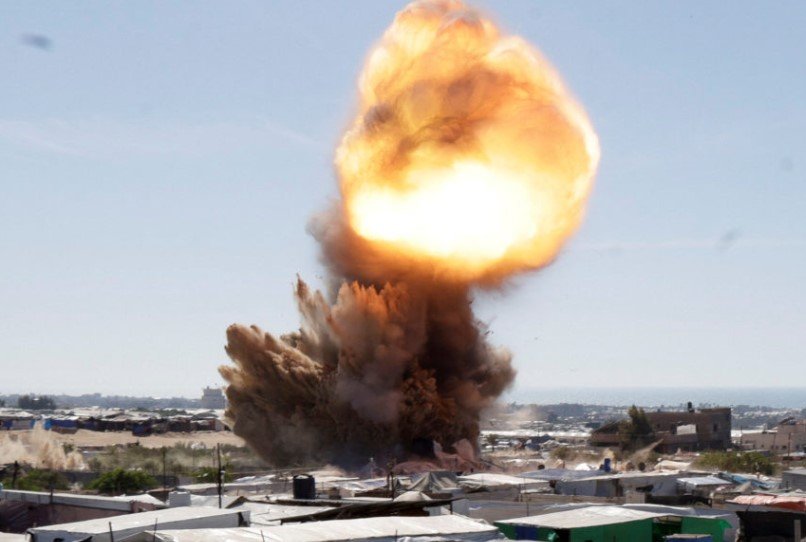Israeli forces launched airstrikes on key Houthi targets in Yemen’s capital Sanaa on Sunday, responding to a missile attack by the group that used cluster bombs against Israel for the first time in the current conflict. The strikes hit a military complex near the presidential palace, fuel depots, and power stations, killing at least six people and injuring dozens more, according to local officials.
Details of the Israeli Airstrikes
The attacks took place in broad daylight, shaking Sanaa with loud explosions that residents described as the strongest in recent months. Israeli jets targeted energy infrastructure and military sites linked to the Houthis, who control much of northern Yemen.
Witnesses reported thick black smoke rising from hit areas, including a major power plant that left parts of the city without electricity. The Israeli military confirmed the operation aimed to weaken Houthi ability to launch future attacks.
Prime Minister Benjamin Netanyahu oversaw the strikes from a command center in Tel Aviv. He stated that Israel would hit back hard against any threats, sending a clear message to the region.
Houthi Missile Attack That Sparked the Response
On Friday, the Houthis fired a missile toward central Israel, which scattered cluster bomblets over a wide area. Israeli officials said this marked the first use of such weapons by the group since the conflict escalated in 2023.
One bomblet landed in a residential yard in Ginaton, causing minor damage but no injuries. The Iron Dome system intercepted parts of the missile, but some bomblets got through, prompting an investigation into why the full threat was not stopped.

Cluster bombs release many small explosives mid-air, designed to cover large areas. Many fail to explode right away and can harm civilians later, which is why over 100 countries ban them.
The Houthis claimed the attack as solidarity with Palestinians amid the ongoing Gaza war. They released video footage showing the bomblets dispersing, highlighting their growing missile capabilities with Iranian support.
- Key elements of the Houthi missile: It carried cluster munitions banned internationally.
- Impact in Israel: Light damage to one home, no casualties reported.
- Houthi statement: They vowed more strikes if Israel continues actions in Gaza.
Casualties and Immediate Aftermath in Yemen
Houthi health officials reported six deaths and 86 injuries from the Israeli strikes, with many victims rushed to hospitals in Sanaa. Rescue teams worked through rubble at the presidential complex and nearby fuel sites.
Local media showed images of damaged buildings and fires at power stations, disrupting daily life for thousands. Yemen’s ongoing civil war has already strained resources, making recovery from such attacks even harder.
International aid groups expressed concern over civilian risks in crowded urban areas. The strikes added to tensions in the Red Sea region, where Houthi attacks on shipping have slowed global trade.
Background of the Israel-Houthi Conflict
The Houthis seized Sanaa in 2014, sparking a civil war that drew in Saudi-led forces and left Yemen in ruins. Since October 2023, they have targeted Israel with missiles and drones to support Hamas in Gaza.
Israel has responded with several airstrikes on Houthi ports and bases, aiming to protect its borders and shipping routes. Iran backs the Houthis, providing weapons and training, which Israel sees as a direct threat.
Recent events show escalation. In July 2024, Israel hit Houthi fuel depots in Al Hudaydah after a drone attack on Tel Aviv. This pattern of retaliation has raised fears of a wider Middle East conflict.
| Timeline of Recent Israel-Houthi Clashes | Date | Event |
|---|---|---|
| October 2023 | Houthis begin missile attacks on Israel in support of Gaza. | |
| July 2024 | Israel strikes Houthi ports after drone hits Tel Aviv. | |
| December 2024 | Massive Israeli airstrikes paralyze three Houthi ports. | |
| August 2024 | Houthis use cluster bomb missile; Israel retaliates on Sanaa. | |
| August 2025 (ongoing) | Investigations into missile defenses and potential further strikes. |
International Reactions and Broader Implications
World leaders called for calm as the strikes risk pulling in more countries. The United States, a key Israel ally, supported the right to self-defense but urged restraint to avoid escalation.
Iran condemned the Israeli actions, denying direct involvement in the cluster bomb use. The United Nations highlighted the dangers of cluster munitions and airstrikes in populated areas.
This clash ties into larger regional issues, including the Gaza war and Red Sea shipping disruptions. Analysts predict more attacks unless diplomatic efforts succeed.
Experts note that Houthi missile tech has improved, with ranges now reaching over 1,500 miles to hit Israel. This forces Israel to bolster defenses while managing multiple fronts.
The economic toll is high. Red Sea attacks have raised shipping costs by 20 percent in 2025, affecting global trade routes.
What Happens Next in the Region
Israel’s military is reviewing its air defense systems to better counter cluster threats. Netanyahu warned the Houthis of a heavy price for further aggression.
Peace talks remain stalled, with Yemen’s civil war complicating matters. Observers say de-escalation depends on progress in Gaza negotiations.
As tensions rise, civilians in both Yemen and Israel face uncertainty. Monitoring groups expect more updates in the coming days.
Share your thoughts on this escalating conflict in the comments below, and spread the word by sharing this article with others interested in Middle East news.
